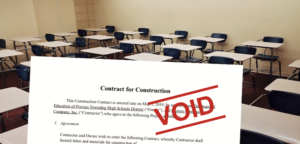
Public works contracts can be incredibly lucrative. But they can also be difficult to navigate, given all the specific rules and requirements involved in contracting with the government. Strict adherence is usually needed, or else a contractor can find themselves short-changed and out of luck, even if the public entity doesn’t follow certain procedures. When two Illinois contractors went unpaid after performing emergency restoration work for a public high school, the Illinois Supreme Court found that their construction contract was invalid. Even so, the court allowed them to recover the payment under quantum meruit.
School district contracts work for emergency repairs
The case in question is Restore Construction Company, Inc. et al. v. The Board of Education of Proviso Township High Schools District
Project Snapshot
- Owner: Board of Education of Proviso Township High Schools District 209 (District)
- Contractors: Restore Construction Company, Inc. & Restore Restoration, Inc. (Restore)
Bidding and acceptance procedures render contract void
At Proviso East High School (Proviso East), a two-alarm fire broke out causing significant damage three months before school was set to reopen. Shortly thereafter, Restore was contacted to provide emergency mitigation services to the high school.
Instead of being submitted to the Board of Education through the standard bidding process, the superintendent signed two contracts on behalf of the District. The superintendent signed one contract with Restore Restoration, Inc. for the remediation work, and the other with Restore Construction Company, Inc. for the repairs. However, the contracts weren’t executed through the typical competitive bidding process.
Pursuant to the agreements, work began on the project. Upon completion, the District refused to pay the final amount due past any payments already made by the insurance company, which totaled around $7.3M in work performed. Around $1.4M was still left unpaid.
Accordingly, Restore filed a lawsuit against the District and a number of other parties on 22 different counts to recover the remaining balance. The District filed a motion to dismiss based on the fact that the contracts were void because they weren’t executed pursuant to the bidding-and-approval process. The trial court agreed, and dismissed all 22 counts.
Appeals court considers quantum meruit in spite of invalid contract
Restore appealed on two accounts, both of which were based on quantum meruit. Quantum meruit, a Latin phrase meaning “as much as earned,” allows contractors to recover a reasonable sum commensurate with the work performed, even if they don’t have a legally enforceable contract.
On appeal, the circuit court decision was reversed. The court agreed that the contracts were void because the hadn’t followed the bidding process, nor were they voted on by the District. They based that conclusion on previous similar cases where the contractor filed a breach of contract claims.
However, this was a claim under quantum meruit. And just because the contract was void, the court found, Restore wasn’t barred from claims based on an implied contract for the value of the work performed under the presumed agreement. The District then appealed.
Illinois Supreme Court upholds quantum meruit decision despite the invalid contract
The Illinois Supreme Court agreed with the appellate court’s decision. The court declared that the contract was invalid under the required bidding procedures. However, the contractor performed all of its obligations in good faith, and these services were willingly accepted by the Board.
It has been well-established in Illinois courts that the “failure of a governmental unit to comply with the required methods for awarding contracts is not fatal to a plaintiff’s right to recover.”
Allowing the District to avoid responsibility would essentially be allowing them to take advantage of their own misconduct. The court granted Restore’s claims for quantum meruit based on the fact that there was a contract implied by law.
Research procurement requirements before accepting public projects
Contractors lose their rights all the time due to technicalities. This decision makes it fairly apparent that public entities won’t be able to avoid liability under an improperly formed agreement. But that doesn’t mean that contractors shouldn’t still be vigilant when accepting public contracts. This was a very limited decision, and it seems the contractors were successful because they based their claim on quantum meruit. Instead of trying to prove a valid contract under breach of contract.
In any case, before you agree to work with a public entity, be sure you understand all of the requirements for bidding and accepting such contracts. Otherwise, you may find yourself with little recourse if a payment issue arises.